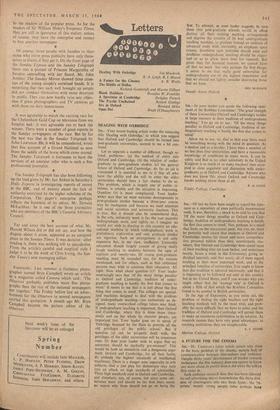SIR,—Of late we have been taught to regard the Spec-
tator as a repository of even politically inconvenient truth. It was, therefore, a shock to be told by. you that 'Of the many things peculiar to Oxford and Cam- bridge, tradition of undergraduate teaching is hardly the first that comes to mind.' Not, perhaps, to a mind that feeds on the sensational press, but you, sir, must he perfectly well aware that students at Oxford and Cambridge receive far closer and more comprehen- sive personal tuition than their counterparts else- where, that Oxford and Cambridge dons spend most of their teaching time (at least twelve, and sometimes twenty, hours a week in this University), giving in- dividual tutorials, and that nearly all of them regard teaching as their most important work, and as the principal function of universities. You ought to know that this tradition is admired universally, and that it is beginning to be followed not only in this country but in the United States, and if you wonder why you might reflect that the 'wastage rate' in Oxford is about a fifth of that which the Robbins Committee found to be normal in British universities.
In the Age of Expansion, as you point out, the problem of finding the right teachers and the right teaching methods will be the most vital, and prob- ably the most difficult, that we have to solve, and the tradition of Oxford and Cambridge will permit them to make an enormous contribution to its solution. As research centres they have very great advantages; as teaching institutions they are irreplaceable.


































 Previous page
Previous page